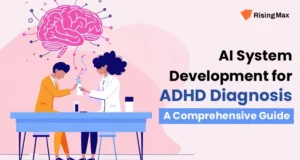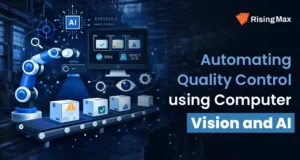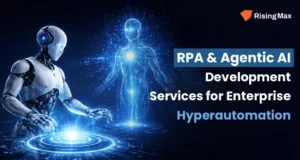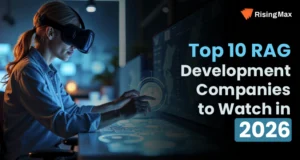Welcome to the future of hospitality!
Artificial intelligence (AI) is revolutionizing the hospitality industry, enhancing customer experiences and optimizing business operations. Explore the fascinating world of AI in hospitality industry.

The hospitality industry is embracing the power of artificial intelligence to enhance customer experiences, optimize operations, and drive revenue. From AI-powered chatbots and virtual assistants to advanced revenue management systems, AI is revolutionizing how hotels and resorts operate.
As AI continues to evolve, the opportunities for innovation in the hospitality industry are endless. From personalized recommendations and customer service to improved security and operational efficiency, AI is shaping the future of hospitality.
To stay ahead of the curve, businesses must adopt AI for hospitality industry and leverage its capabilities to provide exceptional guest experiences. By integrating AI technologies into their operations, hotels and resorts can create a competitive edge, attract more guests, and drive revenue growth.
The future of hospitality is here, and AI is leading the way. Are you ready to embrace the power of AI in the hospitality industry? Join us on this exciting journey into the world of AI in hospitality and unlock the endless possibilities it offers for your business and travelers alike.Examples Of Artificial Intelligence In Hospitality Industry
AI is transforming the way hotels manage their operations. The use of AI in hospitality industry analyzes data from various sources to identify trends and patterns, enabling hotel managers to make data-backed decisions for improved resource allocation and operational planning. Look at some examples of artificial intelligence in hospitality industry that can significantly enhance efficiency.
AI-Powered Chatbots For Customer Service
The most visible use of AI in hospitality industry is employing chatbots for customer service. These AI-powered chatbots and virtual assistants are available round the clock, responding instantly to guest inquiries and requests. Chatbots can handle a wide range of queries, from providing information about hotel amenities to assisting with room reservations.
These chatbots are equipped with natural language processing capabilities, allowing them to understand and respond to guest inquiries in a conversational manner. They can even detect and interpret emotions, providing empathetic and personalized responses like Local LLMs. This human-like interaction enhances the guest experience, making them feel valued and attended to.
Furthermore, chatbots can be integrated with other AI-powered systems, such as customer relationship management (CRM) platforms. This integration allows chatbots to access guest profiles and preferences, enabling them to provide highly personalized recommendations and suggestions. Whether it’s recommending nearby attractions or suggesting dining options based on dietary requirements, chatbots can offer tailored suggestions to enhance the guest experience.
Guest Experiences Through AI In Hospitality Industry
The hospitality industry thrives on providing memorable and personalized experiences to guests. With AI, hotels and resorts can take personalization to the next level. Businesses can analyze vast amounts of guest data to gain insights into individual preferences, behaviors, and purchase patterns.
Using this data, hotels can create personalized marketing campaigns and offers, targeting guests with relevant promotions and incentives. For example, AI algorithms can identify guests who frequently book spa treatments and send them exclusive discounts or packages related to wellness and relaxation. This personalization level increases customer satisfaction and drives revenue by encouraging repeat visits and upselling opportunities.
AI can also enhance the in-room experience for guests. Smart rooms equipped with AI-powered virtual assistants can offer personalized greetings upon arrival, adjust room settings based on individual preferences, and provide recommendations for nearby attractions or restaurants. These virtual assistants can even learn from guest interactions over time, further refining their recommendations and suggestions.
Take your hospitality business to the next level with AI!
Our customized AI solutions and services are designed to empower your hospitality business, streamlining operations and ensuring exceptional guest experiences.
AI-Driven Revenue Management Systems
AI-powered revenue management systems enable hotels to optimize pricing strategies, predict demand patterns, and maximize revenue. By analyzing historical data, market trends, and competitor pricing, AI algorithms can recommend dynamic pricing strategies that adapt in real-time to changing market conditions.
These AI-driven systems can also automate the process of inventory management. By continuously monitoring demand and availability, hotels can ensure optimal pricing and allocation of rooms. This not only increases revenue but also minimizes the risk of overbooking or underutilization of resources.
Artificial intelligence in travel and hospitality industry provides valuable insights into guest preferences and behaviors. By analyzing data from various sources, such as online reviews and social media, hotels can better understand what drives guest satisfaction and loyalty. This knowledge can be leveraged to tailor marketing campaigns and improve overall guest experiences.
AI-Powered Virtual Assistants For Hotel Rooms
In-room virtual assistants are becoming increasingly popular in the hospitality industry. AI-powered devices, such as voice-activated speakers, can provide guests with various services and amenities without human intervention. These virtual assistants can perform tasks such as adjusting room temperature, controlling lighting, playing music, and even ordering room service.
Moreover, virtual assistants can serve as concierge, providing information about hotel facilities, local attractions, and transportation options. Guests can simply ask questions or make requests, and the virtual assistant will provide prompt and accurate responses. This convenient and intuitive interface enhances the overall guest experience, making their stay more comfortable and enjoyable.
Virtual assistants can also learn from guest interactions, enabling them to provide increasingly personalized recommendations and services over time. This level of personalization creates a sense of familiarity and anticipation, fostering guest loyalty and satisfaction.
Security & Guest Safety With AI In The Hospitality Industry
Security and guest safety are top priorities for hospitality establishments. AI technologies are crucial in enhancing security measures and ensuring guests’ well-being. Facial recognition systems powered by AI can be used for secure access control, replacing traditional keycards or PIN codes.
These AI-driven systems can also detect and identify potential security threats, such as unauthorized access or suspicious behavior. By continuously monitoring surveillance footage, AI algorithms can raise alerts and notify security personnel in real-time, enabling swift response and mitigation of potential risks.
Furthermore, AI in hospitality industry examples helps analyze guest data and identify patterns that may indicate fraudulent activities or identity theft. By leveraging machine learning algorithms, hotels can detect anomalies and unusual behaviors, preventing financial losses and protecting guest information.
AI In Hotel Operations & Management
Beyond guest services, AI is transforming various hotel operations and management aspects. AI-driven systems can automate and optimize housekeeping schedules, ensuring efficient allocation of resources based on room occupancy and guest preferences. This reduces manual errors and improves overall productivity.
AI assists inventory management by predicting demand for various amenities and supplies. By analyzing historical data and occupancy patterns, hotels ensure optimal stock levels and minimize wastage or shortages. This data-driven approach enables establishments to streamline their procurement processes and reduce costs.
AI can be used to analyze feedback from guest surveys and online reviews. Natural language processing algorithms can extract insights and sentiment analysis from these texts, providing valuable feedback for improvement. This data-driven approach helps hotels identify areas of improvement and make informed decisions to enhance guest satisfaction.
Benefits Of AI In Tourism And Hospitality Sector
Artificial intelligence has brought immense benefits to the hospitality industry. AI-powered technologies such as chatbots and virtual concierges are available 24/7, answering guest inquiries, making reservations, and even recommending personalized experiences based on individual preferences.
Personalized Guest Experiences
AI enables hotels to analyze guest preferences and behaviors, offering personalized recommendations and services that enhance the overall guest experience.
Efficient Operations
AI streamlines hotel operations through automation, optimizing tasks like reservation management and room service, leading to efficiency and cost savings.
Predictive Maintenance
AI-powered systems can predict equipment failures and maintenance needs, preventing downtime and ensuring that facilities are always in top condition.
Enhanced Customer Service
AI-driven chatbots and virtual assistants can respond instantly to guest queries, improving customer service and freeing staff to focus on more complex tasks.
Revenue Management
AI algorithms analyze market trends, competitor pricing, and historical data to optimize room rates, maximizing hotel revenue in real-time.
Security & Fraud Prevention
AI contributes to the security of guests and their data by identifying suspicious activities, enhancing overall safety, and preventing fraudulent transactions.
Discover the potential benefits of AI for your business. Schedule a complimentary consultation today and unlock new opportunities.
Challenges & Considerations In Implementing AI For Hospitality
While AI offers numerous benefits to the hospitality industry, there are also challenges and considerations that businesses need to address. One of the main challenges is the initial investment required for implementing AI technologies. Significant upfront costs can be involved, from acquiring the necessary hardware and software to training staff and integrating systems.
Another consideration is data privacy and security. With the increasing reliance on AI, hotels need to ensure that guest data is protected and handled in compliance with privacy regulations. Establishing robust data protection measures and transparency in data handling practices is crucial to maintaining trust and avoiding potential data breaches.
Furthermore, there is a need for continuous monitoring and maintenance of AI systems to ensure optimal performance. AI algorithms must be regularly updated and fine-tuned to adapt to changing market conditions and guest preferences. Staff training and support are also essential to ensure the smooth integration and utilization of AI technologies.
All Things Considered
The AI-driven systems can handle a high volume of inquiries simultaneously, ensuring quick response times and reducing the need for human intervention. This improves customer satisfaction and frees staff to focus on other important tasks, ultimately increasing operational efficiency.
AI can analyze vast amounts of data to optimize revenue management. By using algorithms to predict demand patterns, pricing strategies can be dynamically adjusted to maximize revenue. This data-driven approach helps hotels and resorts to effectively manage inventory, improve occupancy rates, and increase profitability.
RisingMax Inc. is a prominent AI development company that helps businesses revolutionize hotel operations, from property management systems to messaging and social media. Consult our experts for your AI-powered business needs.














